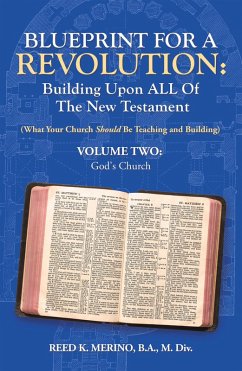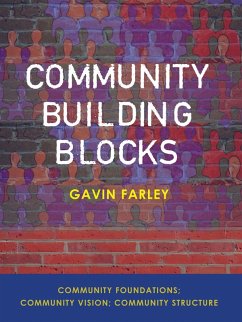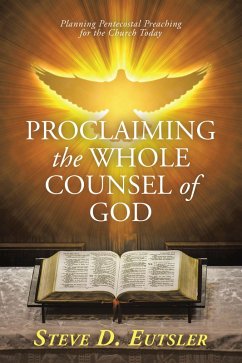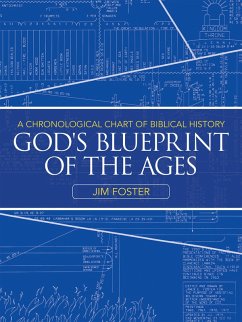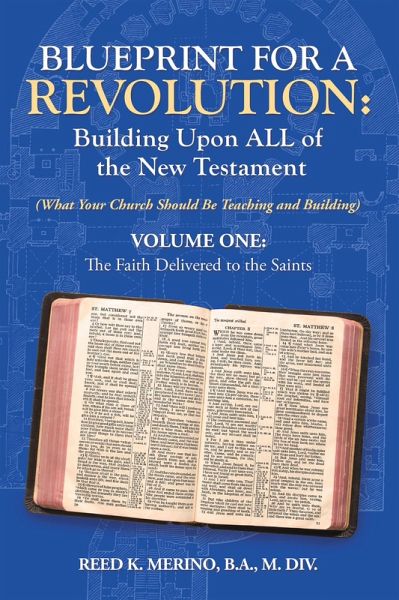
Blueprint for a Revolution: Building Upon All of the New Testament - Volume One (eBook, ePUB)
(What Your Church Should Be Teaching and Building)
Sofort per Download lieferbar
5,99 €
inkl. MwSt.
Weitere Ausgaben:

PAYBACK Punkte
3 °P sammeln!
What if, for more than fifty years, you worked hard to research the New Testament without denominational filters? And then what if you were to organize that research by subject matter? Well, that is what I have done in these two volumes of "Blueprint for a Revolution: Building Upon ALL of The New Testament."What follows is a catechism of apostolic, true Christianity. It is a body of teaching that flows out of taking all New Testament teachings in a grammatically natural and literal sense, the way we instinctively read all serious literature. Testimony from the earliest Christians is also prese...
What if, for more than fifty years, you worked hard to research the New Testament without denominational filters? And then what if you were to organize that research by subject matter? Well, that is what I have done in these two volumes of "Blueprint for a Revolution: Building Upon ALL of The New Testament."
What follows is a catechism of apostolic, true Christianity. It is a body of teaching that flows out of taking all New Testament teachings in a grammatically natural and literal sense, the way we instinctively read all serious literature. Testimony from the earliest Christians is also presented, demonstrating that what those earliest churches taught and lived out was typically identical to what you conclude when you take the New Testament doctrines, commands and promises in that same sense.
In those many years of research, I have never come upon a single church or book that provides a specific set of principles (a.k.a., "exegetical method") by which all Biblical passages are to be interpreted, and that has then set about to consistently surrender to those principles in all the subjects that it covers. My claim, therefore, is that this is the only such catechetical work that does just that.
The importance of this book does not lie mainly in the specific conclusions of any individual chapter, and certainly not in any of my literally skills at presenting those conclusions. It lies largely in the juxtaposition of teachings that are often thought to be in conflict with each other only because the traditions that hold to the beliefs in those chapters have been in conflict with each other. It is my contention that what Jesus considered to be "my church" is what is taught within these chapters, the church that is an incarnation of His "kingdom of God"!
What follows is a catechism of apostolic, true Christianity. It is a body of teaching that flows out of taking all New Testament teachings in a grammatically natural and literal sense, the way we instinctively read all serious literature. Testimony from the earliest Christians is also presented, demonstrating that what those earliest churches taught and lived out was typically identical to what you conclude when you take the New Testament doctrines, commands and promises in that same sense.
In those many years of research, I have never come upon a single church or book that provides a specific set of principles (a.k.a., "exegetical method") by which all Biblical passages are to be interpreted, and that has then set about to consistently surrender to those principles in all the subjects that it covers. My claim, therefore, is that this is the only such catechetical work that does just that.
The importance of this book does not lie mainly in the specific conclusions of any individual chapter, and certainly not in any of my literally skills at presenting those conclusions. It lies largely in the juxtaposition of teachings that are often thought to be in conflict with each other only because the traditions that hold to the beliefs in those chapters have been in conflict with each other. It is my contention that what Jesus considered to be "my church" is what is taught within these chapters, the church that is an incarnation of His "kingdom of God"!
Dieser Download kann aus rechtlichen Gründen nur mit Rechnungsadresse in A, D ausgeliefert werden.




